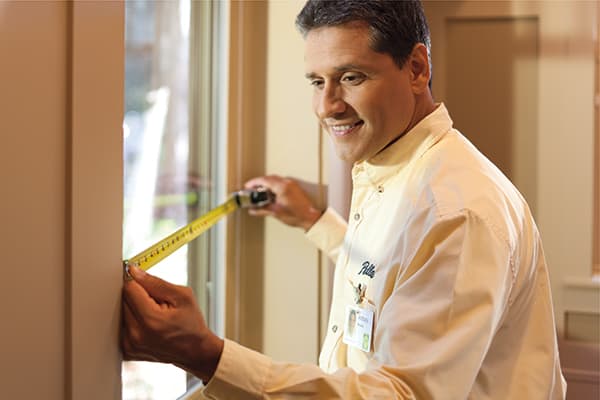DIY Projects - What you can do yourself and when to call a pro
Posted
on October 28, 2022

As an experienced DIYer, you may think that no job is too large, or too small, to take on yourself. Remodeling, rehabbing, and repurposing — you may have tackled many projects around your house. No matter how many projects you’ve completed, there will always be a few that you don’t quite feel comfortable attempting.
Some projects are a great fit for homeowners. Doing it yourself may take a bit longer, but the money saved can be worth the extra effort and leave you with a sense of accomplishment. Some undertakings, however, are best left to the professionals.
DIY or hire a pro?
When determining whether it’s worthwhile to attempt a project yourself or whether to hire a professional, try evaluating the following:
Cost of your time
Generally speaking, taking on a home project yourself will take a bit longer than if you were to hire a professional. Not because you’re doing anything wrong, necessarily, but there are efficiencies to be gained by doing something repeatedly. If practice makes perfect, it also sometimes makes things go smoother, resulting in less unexpected time delays.
Consider the amount of time the project would take to have completed professionally (don’t be afraid to ask about timelines when interviewing professionals). Then think about how long the same project would take you. Set a realistic timeline and allow for unforeseen circumstances. You may wish to allocate extra time to allow for a learning curve. Consider what may happen if your DIY timeline gets extended — and if the consequences of a longer timeline are simply an inconvenience (your house is a mess or you can’t use a spare room) or if it could have a potential negative impact on your home.
Preparations
Do you already own, or can you borrow, the necessary tools to complete the job? If not, consider how expensive these tools are to purchase and whether or not you are likely to use them again in the future. What skills are necessary to complete the job properly? Is it something you already know or will you need to figure it out as you go along? Before attempting a home improvement project on your own, be sure to fully research each step before starting. Many DIYers look to YouTube videos for instruction. Some tasks look easy — especially when demonstrated by a professional — but they may be challenging to complete for those who don’t have the experience.
Labor warranty
When hiring a reputable professional for a job, your project could include a labor warranty. Ask about labor warranties when interviewing professionals. A labor warranty would cover installation costs and the workmanship of the installer. While your material may be covered by a manufacturer's warranty, if it’s not installed properly the first time, you could set yourself up for issues down the road. Also, consider whether a manufacturer's warranty would be impacted by a DIY install.
Building codes
Some projects require a firm understanding of building codes, permits and other important guidelines. Things like electrical or structural work may be subject to your town’s building codes which are mandated for safety purposes. These codes may even rule on what you can and cannot attempt to do yourself. Your work may require a permit and an inspection from a city-employed contractor. Consider the time and expense required for each.
Consequences of failed DIY
Take the time to think through what happens if things go wrong. Brittany Bailey, DIY blogger at prettyhandygirl.com says “I advocate for completing a lot of home improvements yourself. But, the ones I recommend hiring out are the ones that have dire consequences.” Bailey is an experienced DIYer but there are a few projects even she wouldn’t attempt. Here’s what she has to say:
Heights: Any project that requires you to climb a ladder and not be able to keep three points of contact on that ladder. A fall from a distance of as little as 10 feet can be incredibly dangerous. Best to leave elevated projects to the pros.
Electrical upgrades: If you live in the U.S., changing light fixtures or outlets are very easy DIY upgrades you can make to in your home. (If you are adding a ceiling fan, make sure the junction box is secured to a brace that can hold the extra weight.) But, if you want to run new electrical or add electrical fixtures, you are best to leave this to a licensed electrician. (Especially if the new wiring requires a 240-volt receptacle.)
Load-Bearing Walls: If you want to knock out a wall in your home, this can be a fun DIY project. But, I recommend consulting with a licensed contractor first to assess if the wall is load bearing or not. If it is, hire a professional to properly transfer the load with the appropriate beams and support system.
Other projects we’d recommend consulting a pro for:

New windows and patio doors: Accurate measurements are crucial. And improper installation can have a negative impact on both the performance and aesthetics of your replacement patio doors or windows. Plus, installing multiple windows on multiple floors yourself can be a challenging, drawn-out project.
Plumbing projects: plumbing is an area of specialty that requires skill as well as experience. Rachel Joy from joyfulderivatives.com says “I would recommend hiring a professional for any project that includes large amounts of plumbing work — like a major bathroom remodel or a new laundry room installation. It’s critical that plumbing work is done correctly, and there is so much to it! I’d much rather trust a professional that knows how to get every detail done right — from the angles that lead to adequate drainage, all the way to the size of pipe that will allow the correct water flow. Water damage isn’t fun, so I vote to leave the plumbing to the professionals.”
Good DIY projects
Although there are certain projects that we recommend having done professionally, there are plenty of things you can do yourself. If you’re just starting out as a DIYer, here are a few projects that make for an easy introduction to doing it yourself.
Flooring – Today’s flooring comes in some great DIY-friendly options for installation, including click-lock planks that install easily.
Window treatments – Hang curtains or invest in new blinds or shutters. With a cordless drill and a level, you can update your windows with some personality.
Painting – Paint is one of the easiest DIY projects and can really make a big difference. Rachel from joyfulderivatives.com says “One of the best DIY projects for a beginner is painting. This could be painting a wall or two, painting a brick fireplace or even as daring as painting a bathroom vanity! Paint is a good starting point because it’s low-cost and easy to change if you don’t end up liking it!”
Schedule a free consultation to find windows and doors for your home.
